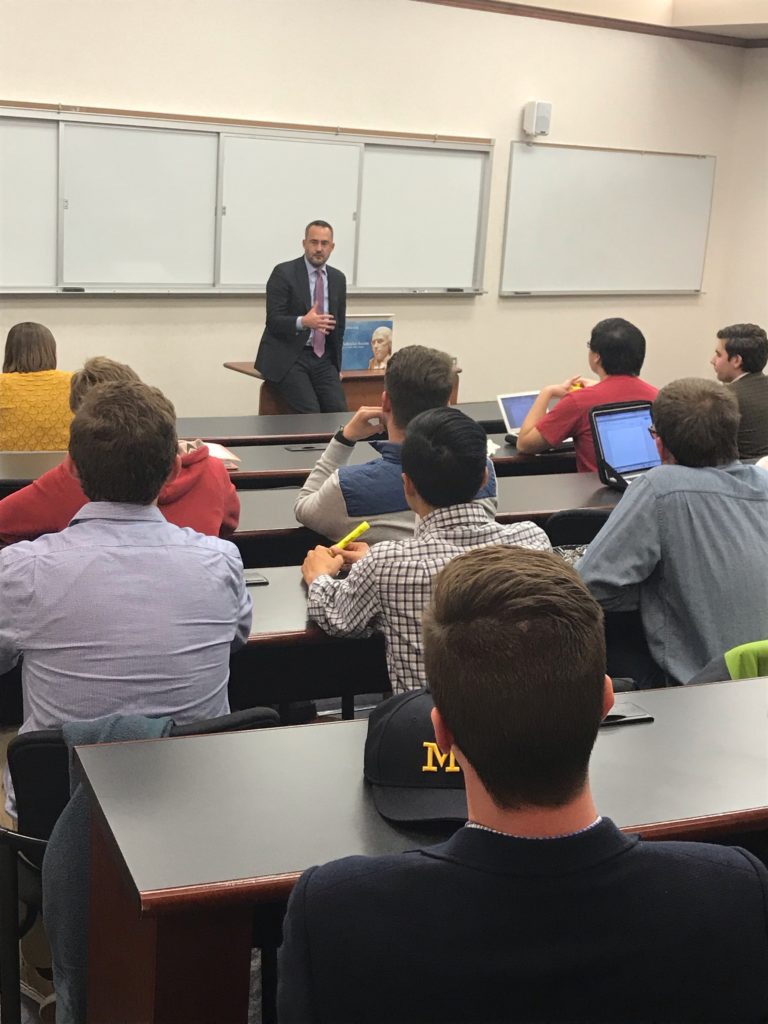
The federal government causes people to engage in criminal activity, said Clark Neily, vice president for criminal justice with Cato Institute, in a Federalist Society speech on Wednesday.
Neily’s speech highlighted the decreasing clearance rates for crimes in the U.S., the high incarceration rate, and the estrangement of the current criminal justice system from the one which the Founding Fathers envisioned.
“The government is probably the single most criminogenic element of our society,” Neily said, “because it has chosen to criminalize conduct that is not morally wrong, that morally upstanding people will continue to engage in and will have to turn to a black market to supply.”
Neily said that the criminal justice system in the United States specifically looks for ways to increase incarceration rates by ensuring that it has a steady supply of people who can be charged for crimes that are easy to prosecute. The government does this by prohibiting something which people are dependent on, such as the use of drugs or alcohol which do not provoke a visceral reaction from the average citizen.
“When you prohibit something, a black market arises along with organized crime, with no peaceful means to resolve business disputes,” Neily said. “They resolve them with violence, which leads to cycle of vengeance, and the supply of criminals the government is looking for.”
Neily then explained that this cycle necessarily leads to low clearance rates for violent crimes, where the police close a case with the belief that they have caught the criminal. Because prosecutors can reach their quotas more easily by prosecuting drug offenders, they are not pursuing the more difficult and dangerous criminals.
“Police devote enormous attention to marijuana possession while ignoring violent crimes,” Nielly said. “This screams bad incentives. Law enforcement is getting less effective at solving the violent crimes that make civil society impossible.”
Freshman Victoria Marshall, a member of the Federalist Society, said that she found Neily’s speech thought provoking and engaging.
“You can see that most people who are incarcerated are there for drug crimes, specifically marijuana. I think that is a huge issue,” Marshall said. “Sure, prosecute drug crimes where there is a lot of violence involved, but we need to ask ourselves, are some of these things really criminal? Should the police be wasting their time on them?”
Neily argued the reason the criminal justice system has strayed so far from the Founding Fathers’ vision of public participation and transparency comes down to the full-time prosecutors that inhabit most jurisdictions. Because prosecutors’ full-time job is to incarcerate criminals, they are incentivized to fulfill a quota rather than seek justice, Neily said. Although the number of people arrested per year has not increased, the number of prosecutions has increased dramatically.
Neily offered a solution to this incentive problem.
“The cost of incarcerating a person is paid by the state, not the prosecutor’s office,” Neily said. “But what if we allowed prosecutors a certain number of spaces in prison? If they want to use them all up on low-level drug dealers, good luck when you catch a murderer. Prosecutors have to decide who really needs to be in prison and prioritize those people.”
Senior Anna Perry, president of the Federalist Society,said she thought the speech was a success.
“The Federalist Society likes to bring in speakers who can speak to both the philosophical and practical aspects of law and policy,” she said. “Neily brought a practical perspective about an issue that is critical for our country and something that Hillsdale students should care about.”

